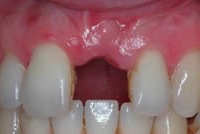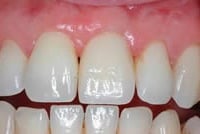Implants
So you are thinking of having dental Implants? This is an information pack to provide a general overview of dental implants. Not all that is written below may be appropriate to your treatment so if you are unsure please don’t hesitate to ask you Implant dentist.
Our team of dentists routinely attend post-graduate courses, and in some cases lecture them, so they are always informed of advances in dental implant technology.
We have been performing dental implant surgery for more than 15 years (more than a 1000 placed) and our staff will put your mind at rest with their knowledge and experience. Our pre and post dental surgery techniques and procedures are second to none and our patients are fully informed throughout using visual aids and a friendly smile!
- Tooth Replacement with Dental Implants
- Denture Stabilisation with Dental Implants
- The Dental 3D CBCT scanner in house, no need to go elsewhere.
- Guided surgery giving more predicable outcomes and faster surgery time.
- All on 4 , All on 6, All on X.
- Teeth in a day ( life changing treatment, fixed solution , taste your food again, eat as normal, smile with confidence)
- 0% finance options available for 12 months.
Dental Implants - Frequently Asked Questions


What is a dental implant?
 The dental implant serves as the replacement for the root portion of a missing natural tooth. It is machined from surgical-grade titanium alloy (Ti 6Al-4V) to exacting specifications. A dentist places the implant into either the upper or lower jawbone. After a period of time, the implant integrates with the bone and becomes a secure anchor for a replacement crown, bridge, partial or complete denture.
The dental implant serves as the replacement for the root portion of a missing natural tooth. It is machined from surgical-grade titanium alloy (Ti 6Al-4V) to exacting specifications. A dentist places the implant into either the upper or lower jawbone. After a period of time, the implant integrates with the bone and becomes a secure anchor for a replacement crown, bridge, partial or complete denture.
Am I a candidate for a dental implant?
If you are missing one or more teeth due to trauma, tooth decay or gum disease, then you may be a candidate for a dental implant. Your dentist will be able to discuss your individual clinical situation. Dental implants will allow you to smile, speak, and eat with confidence and comfort once again.
For surgery you will need to be of good health and the remainder of you teeth will need to be healthy and free from tooth decay or gum disease. Other conditions will need to be treated before surgery.
Also, there needs to be enough bone on the jaw for implant surgery, so we will need to check for bone density, often using a CT scan. There are bone grafting techniques available for patients who have a borderline amount of bone.
Why should I have a dental implant?
Losing one or more of your teeth starts a chain of events that can have physical and cosmetic consequences. The most obvious result is a gap in your smile. Less obvious is the loss of chewing function and the inability to eat a complete diet that can result from tooth loss. While these are certainly serious issues, a potentially bigger problem lies hidden beneath the surface: bone loss.
Your jawbone needs the chewing action of the teeth to stimulate it and keep it strong. Without the teeth present the jaw will begin to disappear (atrophy) in the same manner that the unused muscles beneath a cast supporting a broken bone get smaller. Without the support of your teeth and facial bones, your face will begin to look prematurely aged with increased wrinkles and a more sunken in appearance. The good news is that tooth replacement with dental implants offers a solution to help prevent bone loss.
What are the advantages of dental implants over dentures and bridges?
- Reduced bone loss
Normally, the bone tissue surrounding the root of your tooth is maintained by your body’s natural renewal process. However, if you loose a tooth, you will be left with a hole where your tooth root used to be and the bone around this area will slowly begin to disappear (atrophy) which may change the shape of your jaw. A dental implant placed in that area can actually stimulate bone growth and production, preventing loss of valuable bone structure. - Improved function
Once dental implants are fully integrated into your jaw, they function just as well as your own natural teeth: you can eat the foods you want and speak with complete confidence. With dentures, eating hard foods such as an apple can be a problem: either the dentures come loose or patients cannot withstand the hard biting forces as they cause pain in the gums. Dentures can be supported by implants or mini-implants, which will greatly improve function, enabling patients to eat the foods they want with complete confidence and not having to worry about bone loss and loose dentures falling out. - Improved dental hygiene
Unlike bridges and dentures, which require special cleaning instructions and extra attention, dental implants just need regular brushing, flossing and dental hygiene appointments, just like your natural teeth. - No need to drill or remove any healthy tooth structure
When replacing missing teeth with dental bridges, the teeth adjacent to the gap need to be prepared and healthy tooth structure is removed to accommodate a crown or bridge abutment to fit over the top of the tooth. In the future, if one of the supporting teeth is damaged, the entire bridge restoration will also be compromised, whereas with an implant, the restoration is independent of any of your other teeth. By replacing lost teeth with an implant, no support is required of the adjacent teeth, and your natural teeth do not need to be prepared or altered in any way. - Better aesthetics
If done correctly, a dental implant should be indistinguishable from your surrounding natural teeth. Dentures can come loose and look unnatural if they do not blend with your gums, and some bridges and dentures have unsightly metal clasps to hold them in place. Dental implants provide a much better cosmetic and functional end result.
Can an implant be used as an alternative to root canal treatment?
YES! Not all teeth are good candidates for root canal treatment. Root canal treated teeth are susceptible to decay and fracture, while implants are not susceptible to decay and almost never break. Dental Implants are an excellent and prudent alternative to the root canal, post and core, crown lengthening, and crowning procedures. A lot of patients are referred to the inspire dental care's implant unit because of failed root canal treatment.
Is the implant ever rejected by the body?
The implant is machined from surgical-grade titanium alloy (Ti 6Al-4V), which is a biocompatible material so this is relatively uncommon. However, there is a slight possibility that it will not integrate with bone. If this were to occur, the implant would be replaced with another one. It is highly unlikely that the second implant would not integrate.
What if I smoke?
Smoking can inhibit proper healing of an implant. However, this does not prevent smokers from having implants successfully placed and restored. However, the implant is twice as likely, to fail in a smoking patient than a non-smoking patient. You should speak with your dentist for more specific information relating to your dental needs and the effects of smoking.
How much pain will I experience?
Usually mild to minimal. While undergoing treatment, you will receive local anaesthesia. (Some clinicians may choose to use other forms of anaesthesia.) Implants are becoming increasingly common and we as clinicians are performing them a lot. If you have had other dental treatment done under Local Anaesthetic it is more than likely you will cope very well with the Implant surgery. You may have mild post-surgical soreness for up to 72 hours. An over-the-counter pain reliever will alleviate the discomfort for most patients.
What will the appearance of my mouth look like during my treatment?
During treatment, your dentist may be able to provide you with a temporary replacement of teeth that will have the look and feel that you need during this period of healing. With our implants, it is often possible to have a fixed transitional tooth immediately after the placement of the implant.
How much time is required to have an implant procedure?
A single dental implant placement is usually completed in less than an hour as an office procedure with local anaesthesia.
The implant is then allowed to heal with the bone to form a solid foundation. This usually takes 3 or 4 months in the lower jaw and 5 or 6 months in the upper jaw. During this time, the head of the implant usually remains hidden under your gum and you can continue to wear your temporary replacement. Once you have been given the all clear you can then have your crown, bridge or denture made and fitted.
If you have poor quality bone and bone-grafting procedures are necessary, the overall process can take up to 12 months or more. Your dentist will determine which surgical procedure is best for you.
How much will dental implants cost me?
The benefit of treatment far out ways the cost. 0% finance available. Please refer to your treatment plan for full costs of treatment.
How do I properly maintain the implant once treatment is completed?
Ironically, dental implants require less maintenance than a natural tooth. Simply brush and floss as though it were a natural tooth. Remember, regular visits to the dentist and hygienist, are required for long-term health and success of the implanted teeth and your natural teeth.
How long does a dental implant last?
If your body accepts the implant, it should last many years if cared for properly. Many implants have been in place for more than 40 years.
What is a sinus floor bone augmentation?
When an upper back tooth is lost, the floor of the sinus (air filled space we all have in our upper jaw) drops down into the space formerly occupied by the root of the lost tooth. In order to place an implant in this region, it is often necessary to put the sinus floor back up to where it originally was by adding a synthetic bone substitute. This procedure is called a sinus floor bone augmentation or a sinus lift.
What is a bone graft?
A bone graft is a surgical procedure for adding height or width to a jawbone in order to increase its volume for the placement of an implant.If you are considering an implant but dental x-rays and/or CT scan show that you have a thin jawbone as a result of bone loss then a graft will be necessary.
Your jaw may show advanced bone loss as a result of the ageing process, prolonged denture wear, missing teeth, periodontal gum disease or as a result of an accident.
We can often use your own bone from another site to build up the implant site. An alternative is to use a xenograft. This is where donated bone is harvested from animals rather than a human donor. Bovine (cow) is the preferred form of animal bone for this graft. You may feel uncomfortable about this and worry about the safety aspects but this undergoes a system of rigorous testing beforehand. This is to ensure that it is sterile and compatible with your anatomy and bone composition. This is becoming increasingly routine in implant dentistry
This grafted bone acts as a ‘stand in’ which your body will replace with natural bone over time. This formation of new bone is called ‘Osteoinduction’ which uses a special protein called Bone Morphogenic Protein (BMP) to initiate this response.
